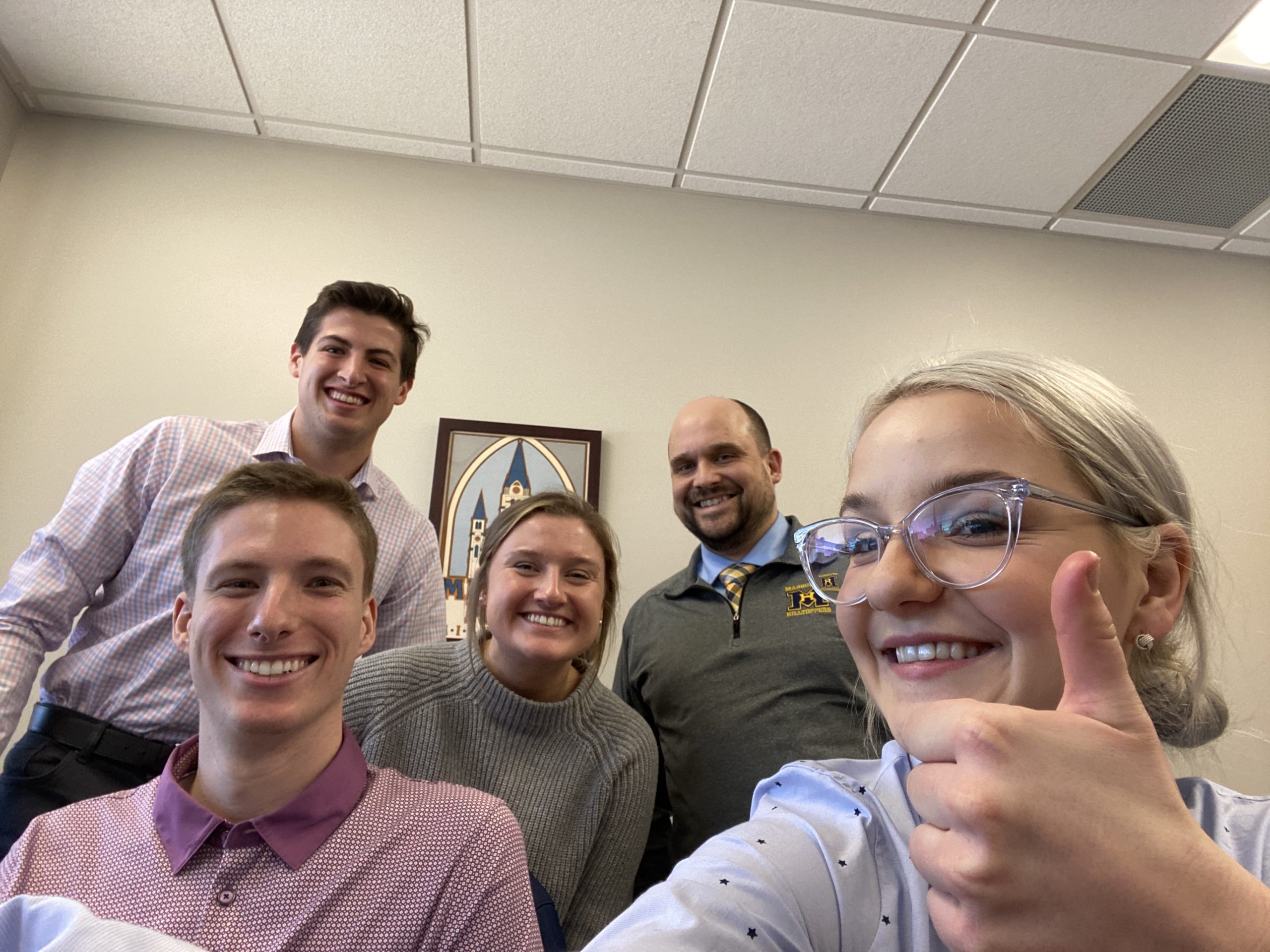
Marquette University High School Director of Technology Nathan Mielke with some of the students from Marquette University Professor Kurt Gering’s class. (Submitted photo)
When Kurt Gering took over teaching the senior design class for Marquette University’s College of Business Information Systems majors, he knew he wanted the course to be something special.
A syllabus full of lectures and case studies culminating in a final exam might have been the traditional route for a capstone course like this. But Gering wanted his students to come away from the class with real-world experience that would give them a leg up in their future careers.
“I thought, wouldn’t it be great if students could partner with real companies and real organizations and help them solve a technology problem?” said Gering, who has been an instructor at MU’s College of Business Administration for almost 20 years.
So he put the word out: have students, will consult. Reaching out to his professional network, Gering went in search of community organizations and businesses whose technology conundrums could become his students’ senior projects.
He found plenty of partners, but one particularly fruitful collaboration came close to home, just down Wisconsin Avenue at Marquette University High School. MUHS has become one of almost 20 organizations to work with Gering’s students over the past three years. Twice now, the seniors have pitched solutions that MUHS actually decided to implement on their campus.
The premise is very simple: an organization has a problem, and Gering’s students spend a semester figuring out how best to solve it. It’s called project-based learning, explained Gering, and it’s as beneficial to the students as it is to the partnering organization.
“It’s designed to simulate as closely as possible what life’s going to be like after graduation,” he said.
This is now the third semester that Gering’s students are managing a project under the supervision of Nathan Mielke, director of technology at MUHS. Previously, Gering’s students tackled two prominent technological issues facing the high school. MUHS was on the lookout for a better student information system as well as new admissions and enrollment software. Over the course of two semesters, Gering’s students found both.
At the conclusion of their semester in the fall of 2020, they suggested that Mielke’s department look into the Qmlativ Education Management Systems product from the Stevens Point-based company Skyward. Then, in the spring of 2021, the next group of students identified Finalsite’s SchoolAdmin software as a potential match for MUHS’ evolving needs in the area of engaging prospective students throughout the admissions process.
Throughout both semesters, the students met regularly with Mielke and a project mentor, a recent MU alum working actively in the industry. Organizations like MUHS who act as project sponsors for Gering’s students are under no obligation to implement the solutions pitched to them by the students — but Gering estimated about 80 percent do.
The initial project is always based on the self-identified needs of the partner organization. Students form groups and rate which projects they would most like to work on. Other group projects in Gering’s class have included optimizing onboarding systems for human resources departments and the development of a disaster recovery plan for compromised files.
Mielke called the partnership “a no-brainer.”
“We’re all educators at heart (at MUHS), so it makes sense to make a connection with the university down the street,” Mielke said, adding that this is just one of a few different collaborations maintained between MUHS and the College of Business Administration. “The more ways we can find connections with higher education, the better off we are, the stronger we are as an organization, the more value we can bring to our students.”
If Mielke were to have engaged the services of a consulting firm to replicate the work done by Gering’s students, it likely would have cost anywhere between $7,000 and $15,000, he said.
From the perspective of the students, the real-world business experience gleaned from this kind of project-based learning is invaluable, said Gering. “If you think about it, academically, students all of their lives have been given a piece of paper and have been told to do what’s written on here and you’ll get some sort of grade. It’s very neat and tidy, but life isn’t like that,” he said.
When talking with his students, he often likens their senior projects — and, by extension, life after graduation — to a ball of twine.
“You have this neat and defined solution, you think. But then when you start to unwind the string, you’re like, ‘Oh, we need to do this, we need to do that.’ Students, as a general rule, are unprepared for that,” he said. “This also gives them a chance to learn the little things we take for granted, like scheduling a meeting and setting an agenda and following up with meeting notes. It’s managing all the different parts of a project, while doing some good for your community at the same time.”
For information about partnering with Gering’s students in the future, or serving as an alumni mentor, email kurt.gering@marquette.edu.
